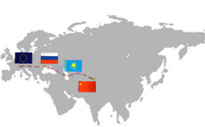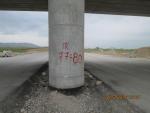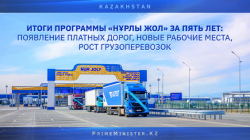
Kazakhstan has started the next five-year plan of the Nurly Zhol Government Infrastructure Development Program. The first five years of the Program implementation resulted in bringing of the share of Republican roads in good and satisfactory condition up to 88% and local roads - up to 71%. This review is about how the road infrastructure of the republic has changed and what the overall effect of the implementation of the program is.
Let us recall, the Nurly Zhol Government Infrastructure Development Program was approved by the First President of the Republic of Kazakhstan - Elbasy Nursultan Nazarbayev in April 2015. The goal of the Program was to integrate the country's macro-regions by building an effective infrastructure.
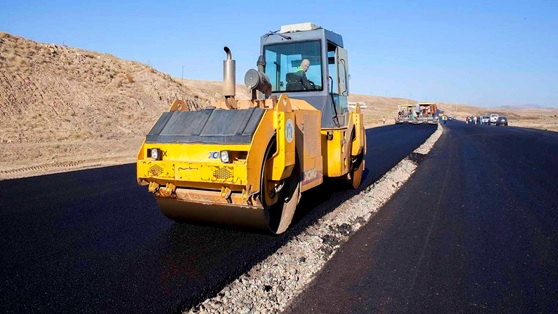
Afterwards, the Nurly Zhol Program has become one of the key drivers of the national economy. Along with the modern and high-quality of roads and highways, new jobs have been created, freight flows increased, and social infrastructure has been improved. Over the five years of implementation, it has become apparent that the Program has a significant impact on the country's GDP growth. According to the Ministry of National Economy, during the implementation of this Program, economic growth was achieved at the level of 16%.
Following the implementation of the Government Program, about 3,000 km of Republican roads have been constructed and reconstructed, including:
Western Europe - Western China - 527 km, Center - South - 324 km, Center - East - 795 km, Kapshagai - Taldykorgan - 160 km, Astana - Petropavlovsk - border of Russia - 177 km, Uralsk - Kamenka - 100 km, Aktobe - Atyrau - Astrakhan - 42 km, Taldykorgan - Ust-Kamenogorsk - 20 km, Kalbatau - Maikapshagai - 18 km, Beineu - Aktau - 382 km, Zhetybai - Zhanaozen - 73 km, Beineu - Akzhigit - 85 km, Schuchinsk - Zerenda - 80 km, Taskesken - Bakhty - 80 km, South-West bypass of Astana - 34 km, Satpayev bypass - 15 km, Pavlodar - Omsk - 59 km, Tobol river bridge - 3 km.
About 10,000 km of Republican roads and 15,000 km of local roads have been repaired.
Following the completion of the Program, the share of Republican roads in good and satisfactory condition has been brought up to 88% and local roads - up to 71%.
The length of Republican roads of I and II Categories has been brought up to 34% (8,200 km).
According to the Ministry of Industry and Infrastructure Development, availability of the roadside service facilities along the Republican roads amounted to 100%. According to the results of 2019, 1,803 roadside service facilities have been functioning along the Republican roads, out of which 883 (49%) meet the requirements of the national standards.
Wide Field for International Cooperation Development
In addition, there are important projects implemented under the Program, namely ICBC Khorgos and the SEZ Khorgos-Eastern Gates, which are able to significantly contribute to the development of transport and logistics potential and the economy of Kazakhstan as a whole.
In 2015, the construction of the Dry Port and infrastructure was completed in 2015 to develop the logistics potential through SEZ Khorgos – Eastern Gates.
Technologically, linked to two railway crossings and the Western Europe - Western China International Transit Corridor at the border with China, the Dry Port forms a powerful transport and logistics hub that will ensure the efficient distribution of freight traffic flow from China to Europe, as well as Central Asian countries, Turkey and Gulf countries.
The total area of the Dry Port is 129 hectares, integrated with the logistics and industrial zones. In the Dry Port, it is possible to provide a full range of transport and logistics services to the customers on One-Stop Shop principle, including customs and brokerage services. In 2019, more than 158,200 TEU (twenty-foot equivalent unit) have been processed at the Dry Port, which is 16% more than for the same period last year.
Since July 29, 2015, the Dry Port has been in commercial operation. The Act of acceptance of the facility into service has been signed on March 24, 2016.
The Length of 4-laned Roads Increased up to 8,200 km
Regarding automobile transport, from 2015 to date the share of worn-out buses has been reduced from 65% to 46%. This was facilitated by the support measures taken by the Government when renew the fleet of city buses. Since the implementation of the Comprehensive Program for the Development of Bus Transportation, 615 buses have been delivered to the regions.
The share of Kazakhstan cargo carriers in the international market of motor transport services has been increased from 40% to 47% between 2015 and the present day. In order to increase this share, the Ministry of Industry and Infrastructural Development of the Republic of Kazakhstan is cooperating with the foreign competent authorities on determining the form sheets exchange quotas considering the interests of local carriers.
In addition, in order to create the environment for increasing the number of domestic cargo vehicles under the Law of the Republic of Kazakhstan “On Amendments and Additions to Some Legislative Acts of the Republic of Kazakhstan on Transport” adopted on April 19, 2019, the rate for the State registration of the trucks aged 3 to 7 years amounted to 350 MCIs, which previously was 2,500 MCI for trucks aged 5 years and older. This allows carriers to purchase foreign cargo vehicles under the age of 7 years (Euro-5) with the lower registration fee.
These measures have contributed to an increase in the number of cargo vehicles for international transport from 2015 to date from 15% to 53%.
In turn, for the proper functioning of regular transport, the full subsidizing of the socially significant routes is required from the local executive agencies.
In this regard, the local executive agencies have allocated KZT23.5 billion to subsidize socially significant routes in 2019, which is 20% more than the funds allocated in 2018 (KZT18.5 billion). This, in turn, contributes to increasing the profitability of passenger transportation and renewing the bus fleet in the subsidized regions of the country.
Under the Nurly Zhol Program, the length of 4-laned roads of Categories I and II has grown (up to 8,200 km). Western Europe - Western China International Road Reconstruction Megaproject, which is the main Transit Corridor in Central Asia, connecting the East and the West, has been implemented. In addition, under this Program, Public Private Partnership mechanism (PPP) has been used in the construction of roads for the first time. Moreover, the transition from expensive maintenance to a more economical method of cold recycling has been started. The importance of the local roads has increased, and for their development will be allocated annually minimum KZT 200 billion.
Toll Roads as a Tool to Ensure Safe and Comfortable Travel
In order to go to a self-maintenance regime, the Toll Systems have been introduced on roads for the first time, which has already shown its effectiveness. Therefore, there are four toll road sections (Nur-Sultan - Temirtau, Almaty - Khorgos, Almaty - Kapchagai) with a total length of 682 km, the maintenance of which is financed by the toll fees.
At the end of 2019, toll fees amounted to 5.4 billion tenge. With a view to further introducing Road Tolling Systems after the proper bidding process, an Agreement was signed in December 2019 for the installation and maintenance of the Systems on 11,000 km of the roads. Under the Agreement, it is planned to install the Toll Collection Systems on the reconstructed road sections with a length of 5,7000 km this year. Launching in test operation is provided from the end of this year.
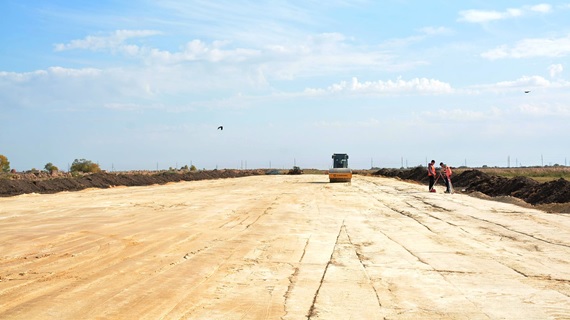
It is planned to introduce Tolling System on the remaining 5,300 km by 2024 after completion of the reconstruction works.
The main goal of introducing such Systems is unloading the State budget. Tolling fees collected are allocated for the maintenance of these road sections and the Tolling Systems without allocating funds from the State budget. In addition, the objectives of the project are to improve the quality of maintenance and soundness of the roads, reduce accident rate, as well as to develop an Intelligent Transport System.
More than 500,000 Jobs have been Created during Implementation of the Nurly Zhol Program
Within 2015-2019 under the Nurly Zhol Government Program 559,300 jobs have been created compared to 392,900 jobs planned, where 93,900 are permanent and 465,400 are temporary.
The Accelerated Start of the Active Construction Works Season under the Nurly Zhol Program
Implementation of the Nurly Zhol and Employment Roadmap Programs for 2020 will give a positive impetus to the development of road transport infrastructure and the accelerated start of the active construction works season, as well as improvement of the following macro and microeconomic indicators:
• Ensuring employment;
• Supporting construction companies by involving them in the works;
• Supporting manufacturers of the construction materials, including petrochemical plants, due to the needs of bitumen;
• Improving the social climate in the regions, as well as their economic development through the repair of infrastructure;
• Favorable impact on the economy of regions and the country as a whole.
In order to accelerate the start of the construction season under the Program, akimats of oblasts and cities have started bidding procedures to identify the Contractors.
In addition, to ensure the timely completion of the construction and installation works, the Contractors are currently carrying out preparatory works.

According to the approved Work Programs, mobilization of special equipment, engineers and technical specialists by the Contractors is planned soon, and construction works commencement is expected in the second quarter of this year.
In order to improve control over the quality of road construction works, akimats will involve the RSE “National Center for the Quality of Road Assets”.
Meantime, under Employment Roadmap Program, the lists of the relevant projects submitted by the akimats have been agreed by the authorized State Agency for the road industry.
Expansion of Public Private Partnerships
The Nurly Zhol Program provides for the expansion of Public-Private Partnerships (PPP) in the construction of roads, which will have a significant effect on achieving the objectives of the infrastructure development of the Nurly Zhol Program. PPP has a number of advantages that allow for the effective implementation of infrastructure projects, including saving the State budget by attracting investments in the projects implementation, expanding models of interaction between the State and business, as well as effective distributing of the risks.
The first Republican major PPP Contract “Construction and Operation of the Nur Zholy Kazakh-Chinese Checkpoint” has been concluded in 2017. The facility has been commissioned in 2018.
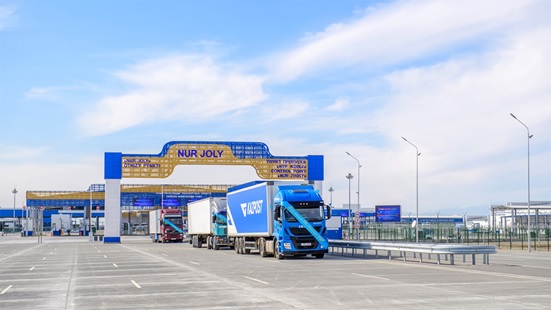
The Project implementation has resulted in the reduction of time for the vehicles from the start of registration procedure to leaving the checkpoint from 180 minutes to 40 minutes.
Currently, at the Kazakhstan-China checkpoint, the cargo flow is 200 vehicles per day, and increase up to 2,500 vehicles per day is expected during next years, which will allow for annual income from imports and exports in the amount of KZT 50 billion, which, in turn, provides self-sufficiency of the Project.
Big Almaty Ring Road (BAKAD) Project
Under the Nurly Zhol Program, in 2015 a two-stage bidding process has been carried out to select the Concessionaire for construction and operation of the 66 km Big Almaty Ring Road (BAKAD) during 20 years. After the bidding procedures, the first Concession Agreement of the Republican significance has been made in 2018 between the Government of the Republic of Kazakhstan and the winner Turkish-Korean Consortium “Alsim Alarco-Makyol-SK-Korea Expressway”.
Project financing agreements have been made in 2019. At the beginning of this year, a Direct Agreement has been signed between the Government of the Republic of Kazakhstan, the Concessionaire and the Grantors. Starting from this year, an influx of foreign direct investment for minimum KZT150 billion will be provided for the implementation of the Project, which will ensure construction with the expected completion in 2022.
In turn, based on the analysis, KZT 231 billion are planned to be collected from Toll Roads for 15.5 years, and KZT 570 billion tenge will be collected for 25.5 years, thereby the project self-sufficiency will be achieved.
Thus, the Nurly Zhol Government Infrastructure Development Program had a positive impact on the expansion and development of the PPP mechanism with gaining experience in achieving the self-sufficient effect when implementing major investment infrastructure projects without using the Republican budget.
Program’s Goals and Objectives of the Second Half-Decade
The President of Kazakhstan Kassym-Zhomart Tokayev in his Address to the People of the Republic of Kazakhstan “Constructive Public Dialogue is the Basis of Kazakhstan's Stability and Prosperity” paid special attention to the implementation of the Nurly Zhol Government Program. The Head of State has noted that the full and high-quality implementation of the Nurly Zhol Program shall be in purview of the Executive Authority.
“This is a strategic Project due to which effective modernization will affect the entire transport infrastructure”, the President of Kazakhstan said.
It is noted that the Government will invest more than KZT 1.2 trillion for these purposes by 2022.
Thus, the Nurly Zhol Program has clearly demonstrated its success and importance for the economic growth of Kazakhstan over the five years of its implementation and today is continuing in the new Government Infrastructure Development Program Nurly Zhol for 2020-2025. The Government of the Republic of Kazakhstan has approved this Program for 2020-2025 on December 31, 2019.
The program aims to create a transport infrastructure that will be comfortable and accessible for the population, will increase mobility, and improve labor productivity and quality of life.
Under the Program, 112 infrastructure projects are planned to be implemented for KZT 5.5 trillion by 2025.
The main tasks of the Nurly Zhol Program for 2020-2025 are:
• Construction and reconstruction of 10,000 km of roads (including 3,800 km of previously approved Projects), as well as rehabilitation and corrective maintenance of 11,000 km of Republican roads.
• The share of Republican roads in good and satisfactory condition will be increased up to 100%, and the length of roads of I and II Category will increase up to 60%.
• Repair of more than 27,000 km of regional and district roads and bringing the share in good and satisfactory condition up to 95%.
• Modernization of the Dostyk - Moiynty road section and electrification of the Moiynty - Aktogai road section.
• Acquisition of 600 new passenger cars.
• Construction of 16 airfields.
• The procurement of 48 numbers of Ships, where six of them are commercial, and the repair of locks.
The following indicators are planned to be achieved under the Program:
• Increase in labor productivity by 40% compared to 2016;
• Increase in investments in fixed assets in the field of “Transport and warehousing” by 308% compared to 2016;
• Creation of new jobs for 550,000 people (where 48,500 are permanent jobs and 502,200 are temporary);
• Bringing of the shares of Republican roads and regional and district roads in good and satisfactory condition up to 100% and 95% respectively;
• To be ranked 50 in the Logistics Performance Index compared to 71 in 2018, the index is evaluated every 2 years;
• To be ranked 49 in the Infrastructure of WEF GCI compared to 67 in 2019, it is evaluated annually.
One of the priority tasks is to provide the population with the road to home, that is, local roads, the total network of which is 70,900 km.
Construction works are being carried out on 4,000 km of the roads in 2020:
Karaganda - Balkhash - Kapshagai, Aktobe - Atyrau - Astrakhan, Taldykorgan - Ust-Kamenogorsk, Kalbatau - Maykapshagai, Kokshetau - Petropavlovsk - Kurgan, Uzynagash - Otar, Merke - Burylbaital, Kostanay – Denisovka and Usharal-Dostyk.
To restore and maintain the technical condition of the Republican road network, it is planned to repair 1,500 km (where 438 km require rehabilitation and 1,100 km need corrective maintenance) of roads, and for this purpose KZT 59 billion is planned to be allocated.
To date, 18 out of 51 biddings for corrective maintenance have been completed.
In 2020, it is planned to open traffic on road sections with a total length of 2,600 km. To date 27% of crushed stone, 44% of concrete products and 14% of bitumen of the total annual requirement are prepared for this purpose.




